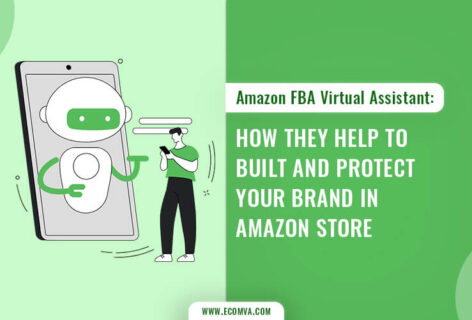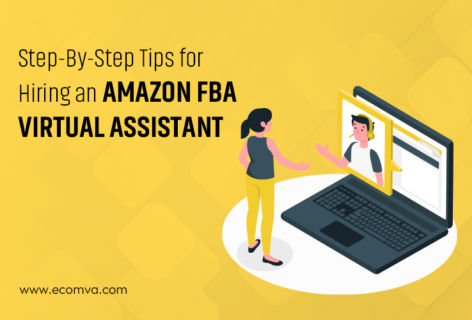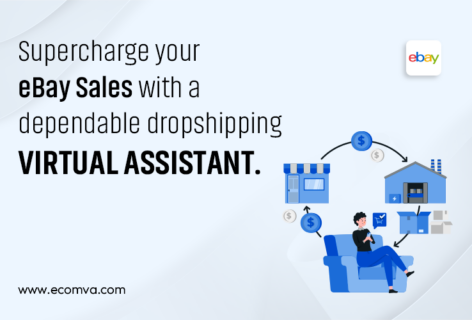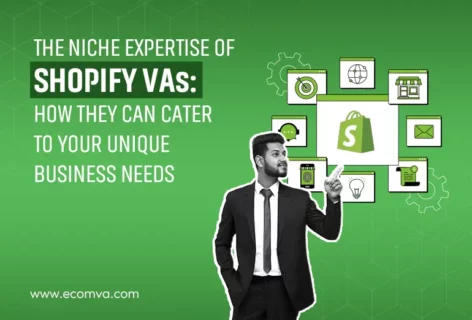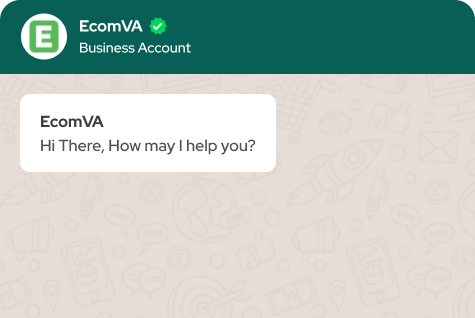18 Tasks You Can Assign to Your Shopify Virtual Assistant
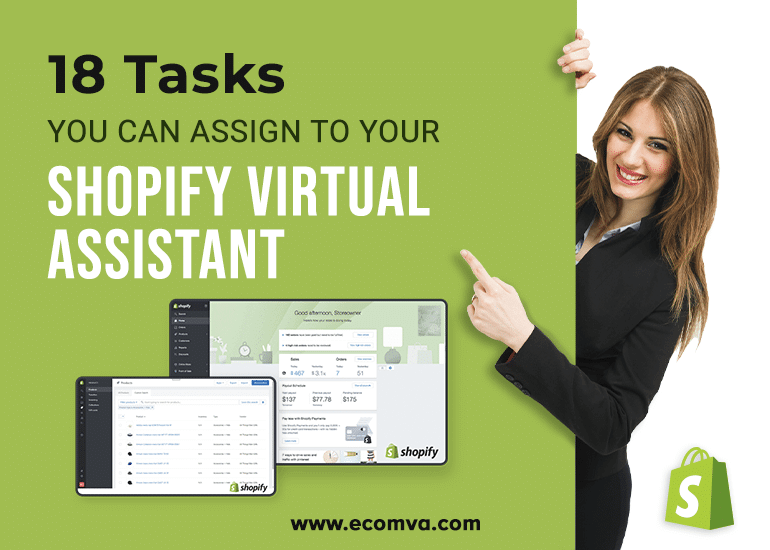
Running an online store without delegation is like trying to fly a plane while building it. This specific statement effectively captures the essence of challenges that are typically faced by Shopify store owners each day. Balancing inventory, marketing, as well as customer engagement can feel a bit overwhelming. But there is a perfect solution—delegating these specific tasks to a Shopify virtual assistant (VA).
With typically the right VA by your side, you would be able to focus on scaling your business while they handle the day-to-day grind. This specific blog mainly explores who needs a Shopify VA, 18 Shopify virtual assistant tasks you can delegate, and how outsourcing can save you time and money.
“Did you know that over 1.75 million merchants use Shopify globally, with many struggling to manage their stores efficiently?” ( Source).
Who Typically Necessitates a Shopify Virtual Assistant?
Are you generally an entrepreneur, a small business owner, or someone who is involved in managing a growing E-commerce brand? If yes, hiring a Shopify virtual assistant or VA could effectively transform the way you focus on handling your business. Many Shopify store owners struggle to balance their strategies with daily operations. This is where a virtual assistant for Shopify steps in.
Who Benefits from a Shopify VA?
| Business Type | Challenges | How a Shopify VA Helps |
|---|---|---|
| Startups | Tight budgets, limited team | Outsourcing Shopify virtual assistant tasks like store setup, product listings, and basic store management. |
| Scaling Businesses | Rising workload, lack of time | Delegating Shopify VA tasks such as order processing, inventory updates, and analytics tracking. |
| Entrepreneurs | Limited resources, need for focus on growth | Help with digital marketing, customer engagement, and Shopify store management. |
| Established Brands | Complex workflows, managing a large team | Support with Shopify outsourcing services for optimization and app integration. |
As professionals are focused on handling the Shopify virtual assistant tasks, when you hire a VA, this makes it easier to run your store. Outsourcing Shopify tasks allows you to focus on what truly matters—growing your brand.
Why Should One Select a Shopify Virtual Assistant?
- Startups often typically lack the budget to hire full-time staff. A VA tends to provide cost-effective help with mainly Shopify store management.
- Scaling businesses need efficiency. Delegating repetitive Shopify VA tasks, like inventory updates, saves time.
- Entrepreneurs require reliable support. Hiring a Shopify virtual assistant helps with essential store operations and customer interactions.
- Established brands need workflow optimization. Shopify outsourcing services ensure smooth operations with expert support.
A Shopify virtual assistant handles tasks that consume your time. Whether it’s product updates, email campaigns, or customer support, they manage it all.
For detailed insights on Shopify VA tasks, read our guide on Shopify VA Niche Expertise.
18 Essential Shopify Tasks You Can Delegate
Running a Shopify store involves many responsibilities. These tasks often take up valuable time and energy. Delegating these duties to a virtual assistant for Shopify can help you focus on growing your business. Below are 18 key Shopify virtual assistant tasks you can outsource”
1. Store Setup and Maintenance
- Theme Customization: Your store’s theme should reflect your brand. A Shopify VA can customize it to create a professional and attractive look.
- App Integrations: Apps improve your store’s functionality. A virtual assistant installs and configures the right apps to meet your business needs.
- Performance Testing: Regular testing ensures your store runs smoothly. A VA identifies and fixes issues like slow load times or broken links.
2. Inventory and Order Management
- Product Listing: Adding products can be time-consuming. A Shopify VA handles this by creating accurate and appealing product listings.
- Inventory Updates: Keeping inventory accurate is important. A virtual assistant updates stock levels and ensures your store reflects real-time availability.
- Order Tracking: Customers appreciate timely updates. A VA tracks orders, resolves issues, and communicates with customers about their order status.
3. Marketing and Sales Optimization
- Creating Discount Campaigns: Discounts attract customers. A Shopify VA creates and manages promotional campaigns to boost your sales.
- Product Bundling: Bundling products increases the value of each order. A virtual assistant sets up attractive bundle offers that encourage more purchases.
- A/B Testing: Testing different strategies helps find what works. A VA runs tests on product pages, emails, and other elements to improve your sales.
4. Customer Engagement
- Chat Support: Customers expect quick answers. A virtual assistant for Shopify provides real-time chat support, improving customer satisfaction.
- Review Management: Reviews impact buying decisions. A Shopify VA monitors reviews, responds to feedback, and encourages happy customers to leave positive reviews.
- Personalized Email Outreach: Personalized emails help build strong relationships. A VA creates and sends emails tailored to customer needs and preferences.
If you struggle with these repetitive tasks, it’s time to hire Shopify virtual assistant. They excel in outsourcing Shopify tasks, ensuring smooth operations. A Shopify VA handles essential jobs while you focus on strategy. Don’t let daily operations slow you down. Delegate these Shopify VA tasks today and watch your store thrive.
To learn more about hiring the right virtual assistant, visit How to Hire a Shopify Virtual Assistant.
Other Tasks Handled By a Professional Shopify Virtual Assistant
-
Social Media Management
There are multiple social media platforms, and you should have consistency on each one to gain better conversions. Shopify supports the integration of Instagram, WhatsApp, and Facebook with your account. Get virtual assistant services to leverage social media followers and convert them into your customers.
-
Content Writing
Content writers are essential players in online platforms. As your content will help the visitors to make the right decisions. Virtual Assistants will write the correct product descriptions, which will help customers to understand and know its benefits. They have the right skills to make your content engaging and keyword-rich.
-
Search Engine Optimization
Once you have completed your content and graphics, it is time to improve its rank on the search engines. When you step into the online world, it is vital to have a strong online presence, where SEO-friendly websites play a crucial role. eCommerce Virtual assistants will follow the best practices, ensuring you gain better ranks on the SERPs (Search Engine Result Pages).
-
Conversion Rate Optimization
This is a complicated process, but it can increase your revenue and provide quality traffic if you follow the right strategies. From a business owner perspective, you cannot take any risks. Hire eCommerce virtual assistant who is an expert in CRO can help turn your visitors into potential customers.
-
Keyword Research
It is essential to get a profitable niche to drive organic traffic, which needs deep keyword research. Work with a Shopify VA who has access to fantastic research tools. They will make a keyword list and optimize that in your content.
-
Get Reports and Analysis
Shopify store has a great collection of analytics tools. The main challenge is when you have to select the best one for your store. Here, the experienced Shopify Virtual Assistant can interpret user behavior with tools and know the proper methods to enhance sales and profits.
How a Shopify Virtual Assistant Saves Time and Costs?
Hiring a Shopify virtual assistant can streamline your Shopify store management and reduce expenses. Let’s explore how a virtual assistant for Shopify compares with hiring a full-time employee and look at real-life examples of cost-saving scenarios.
Cost Comparison: Hiring a VA vs. Full-Time Staff
| Factor | Shopify Virtual Assistant | Full-Time Employee |
|---|---|---|
| Hourly Rate | $5-$25 | $20-$50 |
| Working Hours | Flexible, as needed | Fixed (40 hours/week) |
| Benefits Required | None | Health insurance, PTO |
| Training Costs | Minimal | High |
| Overhead Costs | None | Office space, utilities |
| Recruitment Time | Short (a few days via Shopify outsourcing services) | Long (weeks or months) |
| Specialized Skills Access | Easy to hire for specific tasks | May require expensive training or upskilling |
| Task Versatility | Handles multiple Shopify VA tasks | Limited to job description |
| Scalability | Can scale up or down easily | Difficult and time-consuming |
A Shopify virtual assistant offers flexibility and requires no additional expenses for benefits or office space. This makes outsourcing Shopify tasks more economical compared to employing full-time staff.
Real-Life Examples or Scenarios
Scenario 1: Handling Seasonal Promotions
A small Shopify store owner needs help during a holiday sale. Hiring a Shopify virtual assistant to manage campaigns, inventory, and customer queries saves them time and money. Outsourcing Shopify tasks for the short term allows them to avoid long-term commitments.
Scenario 2: Shopify Store Management for Startups
A startup owner hires a virtual assistant for Shopify to perform daily Shopify VA tasks like product uploads, order processing, and SEO optimization. This decision saves costs compared to hiring a full-time employee, allowing the startup to allocate funds elsewhere.
Scenario 3: Shopify Outsourcing Services for Specialized Skills
When a store needs advanced tasks like email marketing or web design, hiring specialized Shopify outsourcing services ensures expert execution without incurring training expenses for an in-house employee.
By leveraging a Shopify virtual assistant for key Shopify VA tasks, store owners can focus on growing their business while reducing overhead costs.
Explore more benefits of outsourcing in our blog: Benefits of Hiring a Virtual Assistant for Shopify./p>
Checklist: How to Effectively Delegate Tasks to a Shopify VA?
Keys Tips for Communication and Task Delegation
1. Define Tasks Clearly
Break down Shopify VA tasks into specific actions. Mention deadlines and expectations to prevent confusion.
2. Use Simple Instructions
Provide clear and concise directions. Avoid unnecessary details for complex Shopify store management tasks.
3. Prioritize Tasks
Create a list of tasks based on importance. This helps your Shopify virtual assistant focus on urgent responsibilities first.
4. Provide Feedback
Offer constructive feedback regularly. This improves the VA’s understanding of your requirements.
5. Set Regular Check-Ins
Schedule weekly or bi-weekly meetings to review progress on assigned Shopify VA tasks. Address any challenges promptly.
Wrapping Up
Assessing your business needs is crucial for growth. If managing your Shopify store feels overwhelming, consider hiring a Shopify virtual assistant. They can handle essential Shopify VA tasks and improve your store’s efficiency. From managing inventory to executing marketing campaigns, they offer scalable support. Outsourcing Shopify tasks allows you to focus on your core business strategies without stretching your resources.
Explore reliable Shopify outsourcing services to find the right VA for your needs. With the right support, your Shopify store can achieve faster growth and streamlined operations. A virtual assistant for Shopify is an investment that saves time and boosts productivity.
FAQs
1. What is a Shopify virtual assistant?
A Shopify VA is a professional who helps manage your store by handling tasks like SEO, customer support, and marketing.
2. How do I hire a Shopify VA?
You can hire through platforms like EcomVA or freelance websites. Always check their experience and reviews.
3. How much does a Shopify VA cost?
Costs range from $500 to $1,500 monthly, depending on the scope of work and expertise.
4. Can a Shopify VA improve SEO?
Yes, they can optimize content, metadata, and backlinks to boost search engine rankings.
5. What tools do Shopify VAs use?
Popular tools include Shopify apps, Google Analytics, Canva, and email marketing platforms.

